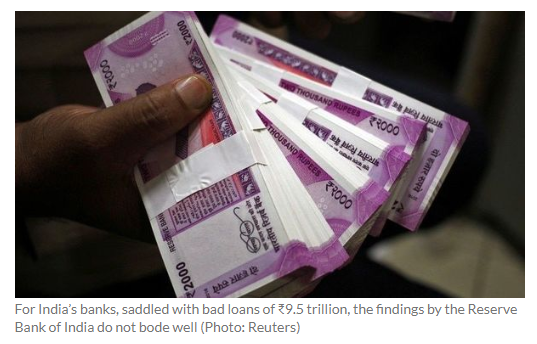3 min read. Updated: 16 Dec 2019, 12:38 AM ISTShayan Ghosh
- As many as 10 banks disclosed they had under-reported NPAs of close to ₹24,000 crore in the year ended 31 March
- The country’s largest lender, SBI, reported the largest bad loan divergence so far this year, under-reporting gross NPAs of ₹11,932 crore
Mumbai: India’s bad loan crisis seems far from over, with as many as 10 banks disclosing they had under-reported non-performing assets (NPAs) of close to ₹24,000 crore in the year ended 31 March.
These banks are State Bank of India (SBI), Yes Bank, Punjab National Bank, Central Bank of India, UCO Bank, Bank of India, Union Bank of India, Indian Overseas Bank, Indian Bank and Lakshmi Vilas Bank. For India’s banks, saddled with bad loans of ₹9.5 trillion, the findings by the Reserve Bank of India do not bode well.
The country’s largest lender, SBI, reported the largest bad loan divergence so far this year, under-reporting gross NPAs of ₹11,932 crore. Divergence refers to the difference between what a bank reports as its bad loans and provisions, and what the central bank finds when auditing that bank’s books. SBI also reported divergence in provision of ₹12,036 crore. The bank disclosed the divergence to the stock exchange last week.
Earlier, SBI had reported its highest bad loan divergence of ₹23,239 crore for 2016-17.
While loans turn bad once the repayment overdue exceeds 90 days, provision is the money set aside for each loan a bank disburses. Provisions mirror the change in an asset’s classification from standard to NPA and increases as the asset deteriorates.
In 2017, the central bank directed banks to disclose the extent to which their assessment of NPAs and their provisioning diverged from that of RBI, and released guidelines for such classification. In April, RBI mandated banks to disclose information about provisioning divergence, if it exceeded 10% of a bank’s pre-provisioning profit. Banks were also directed to disclose information if additional NPAs were more than 15% of reported NPAs. The divergences were disclosed in the notes to accounts in annual financial statements following the RBI directive.
After SBI, the largest divergence in gross NPAs was reported by private lender Yes Bank. According to the bank, RBI found under-reporting of bad loans by ₹3,277 crore in the year ended 31 March.
Following these disclosures, experts have raised questions about the role of auditors in the reporting process.
“From a regulatory perspective, auditors are the first line of defence, as bank accounts are prepared in accordance with the guidelines determined by RBI, with which bank auditors are well-versed,” independent analyst Hemindra Hazari wrote in a note on 11 December. “Hence, if the regulator RBI has detected misreported accounts, the auditors have to be held responsible and need to be penalized.”
“As banks hold unsecured deposits from the public, are highly leveraged and play a critical role in payments in the economy, they have to maintain the highest ethical standards. Indeed, by their very nature, banks are meant to stand for integrity and trust,” added Hazari.
Others said lenders are not always at fault and the central bank would have sought NPA classification of some assets in retrospect and with abundant caution. According to Prakash Agarwal, head of financial institutions at India Ratings and Research, not all divergences are a result of incorrect reporting or error of judgement.
“In many cases, the stress in the account may have become apparent only in subsequent quarters after March ending,” Agarwal said. “In such cases, it would be challenging for banks to pre-empt stress and, hence, report such account as non-performing. Further, in many cases, divergent accounts would have been factored in the reported results of the first half of the year.”
Banks such as SBI and Yes Bank have said they already provided for some of these loans and the rest will be done in Q3 FY20. SBI said it has to make provisions of ₹4,654 crore in the December quarter as the rest has been factored in the first half of the fiscal. Yes Bank said its remaining provision is ₹632 crore in Q3.














